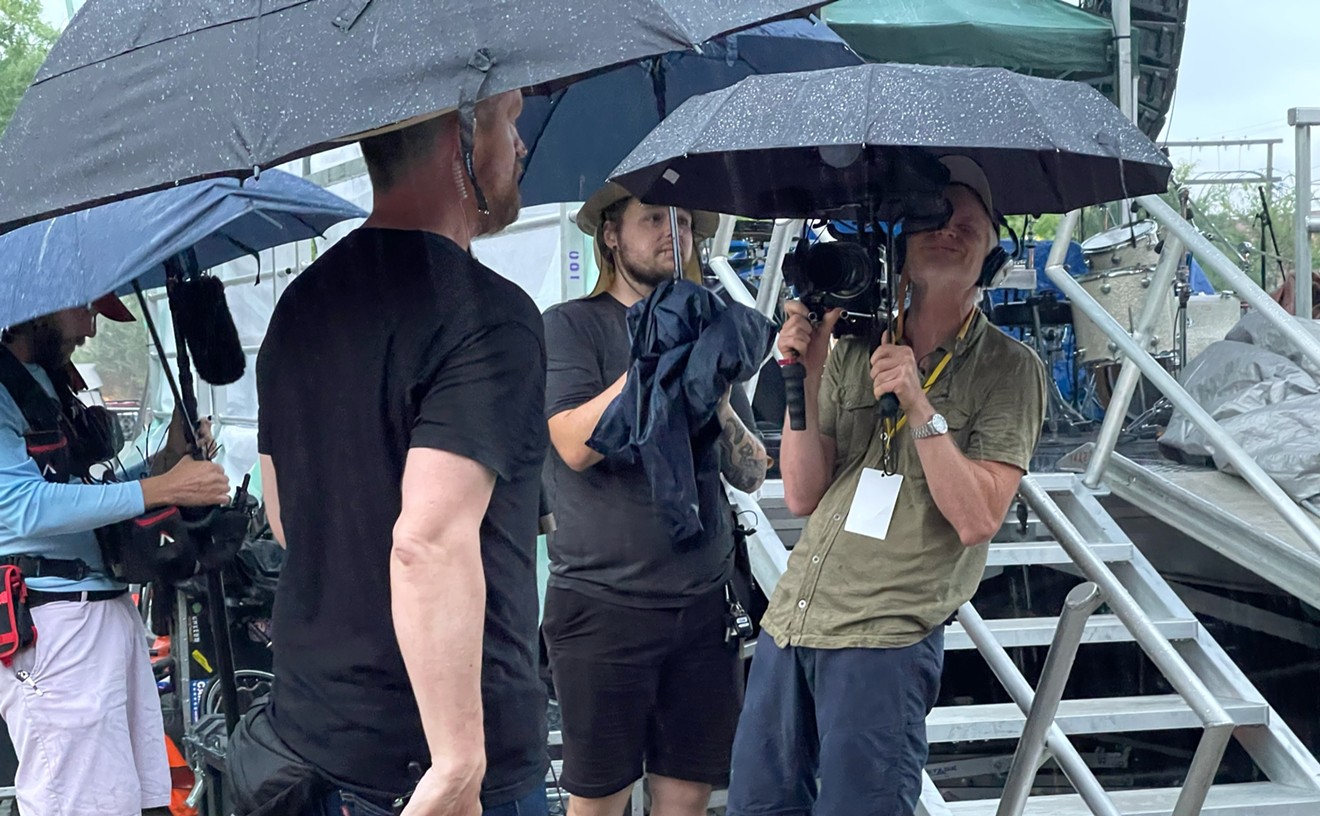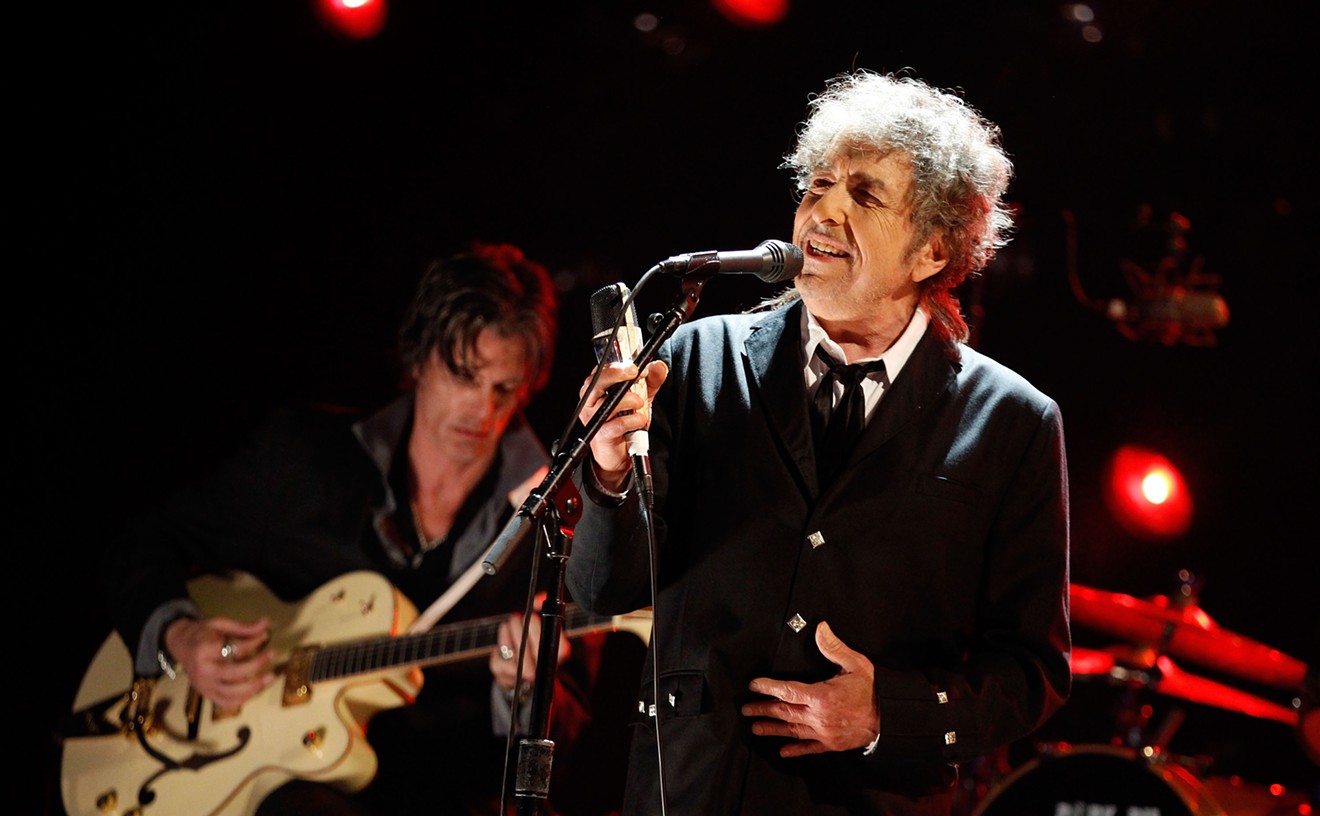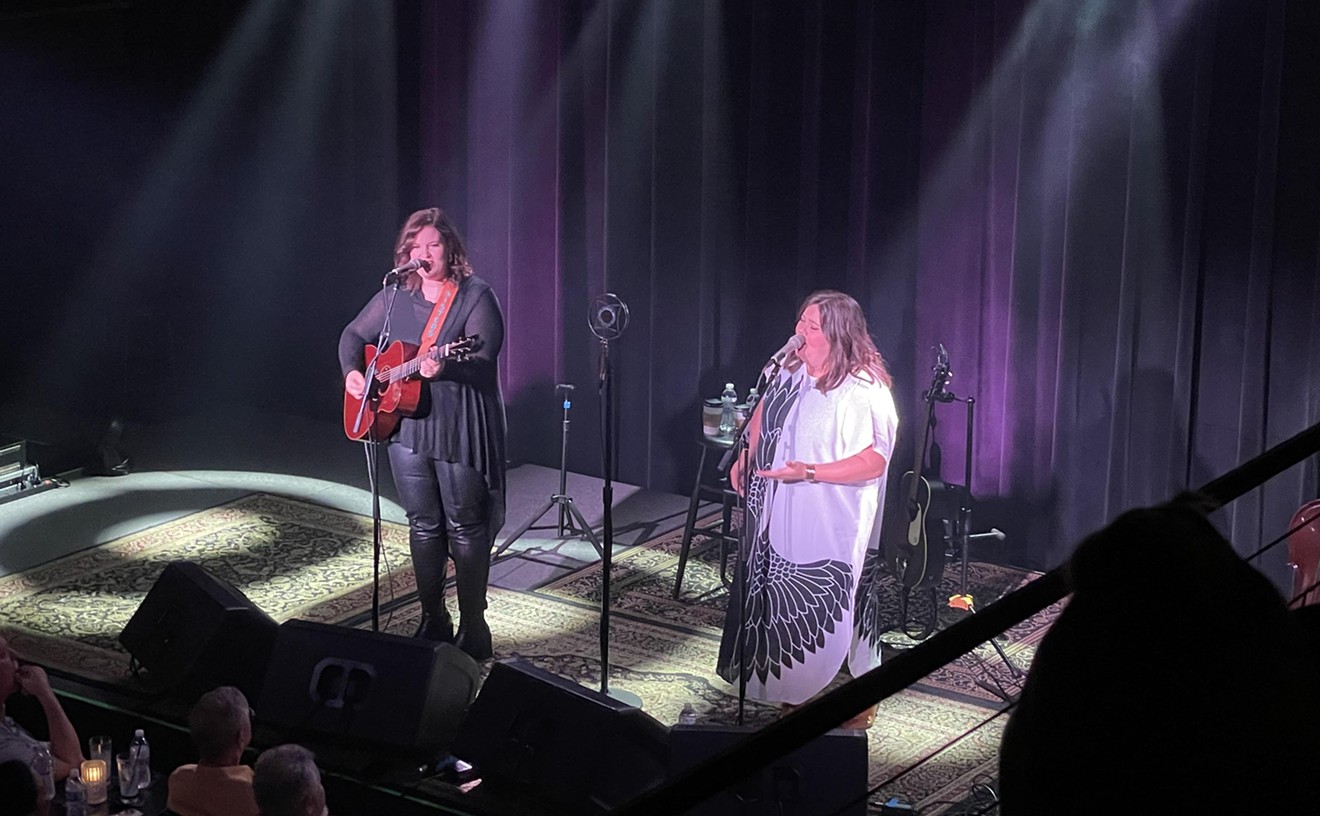Bobby Patterson, then, is no legend: He's just one of so many talented musicians who never found success when they deserved it most, who crawled toward fame too elusive to grasp. He has spent his entire adult life knowing he could have and should have been as famous as James Brown or Wilson Pickett or so many of his heroes, and listening to his own records knowing they were as good as anyone else's, and yet few recognize his name or his voice. He's one of those greats doomed to boxed sets and their liner notes, a paragraph who deserves a novel of his own.
Patterson, who was born 51 years ago on Baldwin Avenue near Spring Street in South Dallas, and who looks not so different than he did 30 years ago, boasts impressive credentials for a forgotten man.
He had a couple of modest hits in the 1960s for the long-forgotten Abnak Records label in Dallas, a few more would-be classics for the Jewel/Paula label out of Shreveport, Louisiana, in the 1970s. At Jewel, where he was employed from 1970 to 1973, he was labelmates with John Lee Hooker, Lightnin' Hopkins, and Charles Brown, and he produced and wrote for the likes of Fontella Bass (best known for "Rescue Me" at Chess Records), Little Johnny Taylor, the Montclairs, and Bobby Rush.
He has had his songs recorded by the likes of Albert King ("That's What the Blues is All About" for Stax) and the Fabulous Thunderbirds (who twice recorded "How Do You Spell Love?"). Now a rendition of Patterson's 1972 song "She Don't Have to See You (To See Through You)" sung by Wilco's Jeff Tweedy can be heard on Golden Smog's Down by the Old Mainstream. It's a version of which Patterson heartily approves: Hearing the song for the first time, he nods his head and taps his foot, impressed.
"They kept it simple," Patterson says, "and soulful, just the way I wrote it."
Though Patterson has never heard of Golden Smog--or the Jayhawks, Soul Asylum, Wilco, or any of the other bands from which Smog members hail--the soul singer wishes nothing but success for the boys. That way, maybe Patterson can make some of the royalty money he's been owed since Warner Bros. and Capricorn Records released the Jewel/Paula Story boxed set two years ago. The box features Patterson's four great contributions to the label--"Right on Jody," "How Do You Spell Love?," "She Don't Have to See You," and the astonishingly funky "Quiet! Do Not Disturb (While I'm Making Love)"--but Patterson says he hasn't seen dime one from sales. Such is the life of the journeyman R&B singer who possesses a wealth of talent but few riches.
Patterson now sits in a Deep Ellum Vietnamese restaurant pondering his musical past and possible future. It has been 18 years since he released anything, almost two decades since he quit singing and writing to promote records made by other people, but now he has the itch to stand in front of the microphone and strap on a guitar and rekindle a career.
"I don't want to come back too big, and I don't want to come back too small," Patterson says. "I wish it'd come somewhere in the middle. I don't want to come back too small, playin' those little hole-in-the-walls. I want to play Hard Rock Cafe, House of Blues, B.B.'s club in Memphis. I'm kind of nervous about it, having been gone so long, but I'm excited about it, too. I had to start playing again. I hadn't played guitar for so long my fingers were starting to freeze up on me."
Patterson wears a black leather jacket and matching hat, something of a trademark (as is his captain's hat). He carries with him a test-pressing CD of his comeback album, appropriately titled Second Coming. A good hunk of the material was recorded in the 1970s with the same backing band Bobby Bland continues to use, and the record recalls the lost sound of Muscle Shoals, huge horns and swelling string sections giving the music that bigger-than-life feel they used to come up with at Stax in Memphis and at Paula. Patterson will have no synthesized soul, even if it costs him a little extra to redub a new vocal over the never-used brilliant old instrumental tracks.
The amazing thing about the record is the way Patterson's voice sounds: young. Perhaps because he has not sung in 20 years, save for the occasional guest appearance somewhere along the rapidly shrinking "Chitlin' Circuit," Patterson has managed to save his voice instead of wearing it ragged. Amazingly, he still sounds as he did as a young man recording for Abnak's soul subsidiary, Jetstar, back in the '60s when Patterson was writing and performing such songs as "T.C.B. or T.Y.A.," "What's Your Problem Baby?," "I'm Leroy, I'll Take Her," "My Thing is Your Thing," and "Broadway Ain't Funky No More."
He possesses the voice of a classic soul singer, born in the church and raised in the barroom. When he performs those "realistic songs," as Patterson calls his self-penned poetry of the cheating man and the vengeful woman, he can still moan and groan and yell with the best of them, his voice even now containing the echoes of Otis Redding, Wilson Pickett, Jackie Wilson, and so many others Patterson revered as a young man. Where so many of his contemporaries lost their voices, misplacing them in chicken-shack nightclubs or in the bottom of a bottle, Patterson's has retained its purity, its conviction, and its fire after all these years.
"I got more fire for it now than I did in the beginning," he says. "I've been out of the business for so long, stayed away from it, and my interest in it is rekindled because you still see guys who were doing it 20 years ago doing it now, and you know there's still that challenge. That fire comes back. I just know more about the business and can relax more than I could 20 years ago. Now, I'm just doing it for the love of it."
Nearly 40 years ago, Patterson played his his first gig near his South Dallas home. For his services, he was paid one watermelon.
While attending Lincoln High School, Patterson wrote his first song, about a girl he liked named Pat. It went something like this: "I love you, Pat." The song was expanded when Pat rejected Bobby's advances: "I love you, Pat/I want you back."
In 1960, Patterson and his first band, the Royal Rockers, won a KBOX-sponsored contest, which meant they'd get to record a real record in Los Angeles. But it didn't work that way.
"Only thing I remember about that recording session was they had a big empty barn with a piano," Patterson recalls. "I think it was Capitol Records, and they gave us first-class treatment. Yeah, we got out there, and we were right in the heart of the ghetto. We had to take a cab to the session, and the album never came out."
Such were the auspicious beginnings of Patterson's career, along with a few years spent playing the local fraternity and sorority party circuit, playing Chuck Berry and Little Richard covers for the white kids at S.M.U. and T.C.U. Every now and then, Patterson would try to sneak in one of his own songs, but the kids would stop dancing, sending Patterson back to "Tutti Frutti" or "Johnny B. Goode."
He was "discovered," as it were, by John Abdnor Jr. when both men were attending the University of Texas at Arlington. Patterson began recording with the Mustangs in 1963 for John Abdnor Sr.'s Abnak, and for the next seven years he would remain on the label, chomping at the bit--aching to get to Memphis and Stax Records, so sure he'd be big if only...
Abnak Records and its Jetstar subsidiary were founded in the early 1960s by Abdnor Sr., a local insurance man who was indulging his son John Jr.'s fantasy to become a rock star. John Jr. would release a couple of records under the name Jon and Robin, scoring something of a hit with "Do it Again a Little Bit Slower" in late 1966, but he couldn't sing worth a damn. He would, many years later, wind up in a mental hospital and then in prison after brutally executing his girlfriend with a shotgun blast to the head.
Abnak did manage a big-time national hit with the Five Americans, who scored four Top-40 hits during the mid-'60s and recorded four full-length albums (including Western Union and another double record, a rarity in the 1960s). But the Five Americans were Oklahoma boys who wanted to sound English, launching their own British Invasion from the shores of Ross Avenue.
Patterson was the label's best shot for greatness. His Mustangs, most of whom hailed from Sherman, were the tightest band in town; they knocked 'em out at clubs like LouAnn's and Soul City and the Red Jacket and the Blackout, playing songs by the Beatles, old country-western artists (Patterson's biggest influence lyrically), Freddie King, and others. Patterson, who would also tend to the frenetic John Jr. on the road and record every now and then, somehow managed to score a Top-40 single of his own with "T.C.B. or T.Y.A." in 1969.
"'T.C.B. or T.Y.A.' was the first song I wrote that I was proud of," Patterson says. "That was when I knew I could write songs 'cause I was proud of that. I wanted to come out with something natural, something I wrote, and that was me. That song was Bobby Patterson--'Take care of business or tear your...turn yourself around.'" Patterson breaks into a fit of laughter. "That was what John [Abdnor] wanted. The original line was, 'Tear yo' ass.' We need to do that again because now you can say 'ass' and get away with it."
When Abnak began failing in the late 1960s, Patterson moved to Shreveport to record for Stan Lewis' Jewel/Paula label which, like Abnak, was a family business--this one run by a white man whose passion was the black music that surrounded him. Patterson, who also briefly experimented with his own label (Soul Power) and ran his own studio (Sound Studios), would team up with Jerry Strickland and become one of Jewel's house writers, infusing Strickland's diehard R&B sound with Patterson's country-music lyrics. They cranked out songs for Little Johnny Taylor ("Open House at My House, Part 1," which went to No. 16 on the R&B charts in 1972), Fontella Bass, and for Patterson himself; Patterson's 1972 album, It's Just a Matter of Time, is a lost jewel, so to speak, containing brassy funk ("Quiet! Do Not Disturb") and Hammond-drenched soul ("She Don't Have to See You"). Every song had a story, mostly about men running around on their women and those women exacting their revenge.
"One of the best songs I ever wrote," Patterson says, "was a female song called 'Do You Still Feel the Same Way?' It went, 'Now that you got what you want, do you still feel the same way?' We recorded that for Tommy Young at Jewel/Paula, and it went to No. 1 in Memphis and Philadelphia.
"I like to try to write a song that appeals to both men and women, which is hard to do, and at the same time tell a story from beginning to end and have a significant message in the song," Patterson says. "I like to tell a story. Once you hear the first line, you're going to want to hear how it comes out. That comes from listening to all that country and western growing up."
Patterson moved back to Dallas from Shreveport in 1973 and began releasing and recording his own albums, the last of which was The Storyteller in 1976. After that, Patterson became an independent record promoter in the South, working for labels like Malaco and Profile. It would keep him in the music business, but out of music, for two decades.
"When I got out of the singing business, I learned a lot of about what radio stations looked for in a record and how they categorized records," Patterson says. "But, being a writer and performer, I don't like to categorize anything. Music is music. I can't wait to get back to makin' it.










